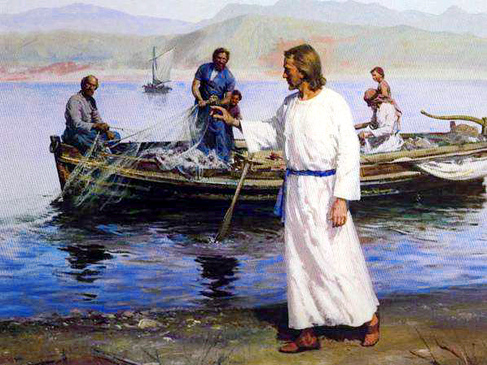You have heard that it was said, ‘Eye for eye, and tooth for tooth.’ But I tell you, do not resist an evil person. If anyone slaps you on the right cheek, turn to them the other cheek also. And if anyone wants to take your shirt, hand over your coat as well. If anyone forces you to go one mile, go with them two miles. (Matthew 5 38-41).
Oh Jesus, how costly your words are.
Recently, when I’ve suffered actual or perceived injustice or annoyance, and have taken up the matter with Jesus, I’ve heard him say, “Let him.” “Let her.”
“Just don’t get entangled with evil, with resistance, with revenge. Let them do what they want to do. I am the ultimate score-keeer, the umpire, who will provide you another coat, and strength to walk the third mile on your own business after you’ve marched two miles carrying the Roman soldier’s gear.”
* * *
If we do not “let them,” if we plot revenge, if we put our emotional hooks in our enemy’s flesh, mentally dragging them behind us everywhere, we get embroiled in an endless tit-for-tat world of malice.
The principle of an eye for an eye, applied in the Code of Hammurabi, Judaism and Islam was neat, merciless, and there an end. But in our more sophisticated societies, what constitutes an eye for an eye is not so easily calculated. People extract revenge in all sorts of ways: gossip, slander, blocking, passive aggression, malice, and pettiness.
Sad for the victim, and sad too for the perpetrator—whose character becomes smaller and meaner and shrivels, becoming increasingly cut off from the waterfall of the grace and power of God. Once we put those who have wronged us on a mental blacklist, unconsciously ready to get even given a chance, we are no longer quite so open to God’s guidance; the presence of the Holy Spirit no longer pulses in our souls.
But what are we to do when we suffer injustice? Because we well might. The enemy of our souls stalks this world, twisting, corrupting, darkening. However, he plays against the Grandmaster who will, of course, ultimately win.
* * *
Let tell you a story of my initial failure and ultimate success in one of my encounters with evil. And about one way I have stumbled on to heal after experiencing evil.
Several years ago, I was wronged, unfairly treated, and humiliated. Because this happened at an extremely vulnerable point in my life, it precipitated an episode of “great sadness.”
A couple of years after that incident, through an unexpected turn of events, I got to “whistle-blow,”—I publicly pointed out a severe dereliction of duty on the part of the person who had unfairly treated me. They resigned from their relatively well-paid sinecurish job.
Quits, huh? This person furiously said to me, “Well, you’ve got your pound of flesh now, haven’t you?” And I childishly replied, “No, what you did to me was far worse.”
But yes, I had got my pound of flesh, plus. However, each time I remembered how I had been treated, my heart burned with indignation at the injustice and shaming. I wanted to do something about it, all over again. Though, I had already done something. As they said, I had had my pound of flesh. (And eating anger probably did add some pounds of flesh to my frame.)
We will never feel quits, never, because the memory of past wrongs feels fresh again. And at the “re-injury,” we again want to get even, though heck, we’ve already done so in so many petty soul-corrupting ways, damaging our souls, damaging our communion with Jesus, and with his sweet spirit.
* * *
And so for our protection, Jesus tells us not to even try to get even. But we are not to sit all tensed up saying, “I will not take revenge. I will not think of a pink elephant.”
There are other ways for the soul to heal. One is do good to those who have injured you. And what when our soul cannot yet stretch to that sublimity? When we cannot bring ourselves to do our enemies a good turn?
I am reading Brene Brown’s Daring Greatly. She quotes psychologist James Pennebaker who says that the act of not discussing a traumatic event or confiding it to another person could be more damaging than the actual event. Conversely, when people shared their stories and experiences, their physical health improved.
In his book Writing to Heal, Pennebaker says, “The act of writing about traumatic experience for as little as 15 or 20 minutes a day for three or four days can produce measurable changes in physical and mental health. Emotional writing can also affect people’s sleep habits, work efficiency, and how they connect with others.”
So then, I write my three morning pages about this particular episode which still made me feel outraged when I thought about it.
* * *
And as I write, I see it wholly, not just all the infuriating bits, but the whole chain of events, including my culpability.
In scripture, a turning point is often marked by the phrase, “But God.” And unexpectedly, God steps in. As I was able to see those disturbing events more clearly, I was also able to see the good God brought out of them.
He showed me that his loving kindness had been extended to me, though other people may have behaved out of insecurity, competitiveness, jealousy, malice or in a good old-fashioned power struggle. Augustine writes in his Confessions that his teachers acted towards him in malice or indifference, but God was working too, turning it to good.
I then had been leading and spear-heading something I shouldn’t have been because I was overwhelmed and beside myself in my personal life. I need to get my house in order, literally. I needed to get my business profitable. I need to stabilize my emotions. I needed more sleep, more rest. I needed to write, which I wasn’t doing at all. I needed the desert, which I so chafed against. I needed an Elijah experience of sleeping, eating and resting. I needed to see God in the wilderness like Hagar did. And I needed to emerge from it, strong, leaning on my beloved.
And through my enforced sojourn in the desert, forced on me by these people, I developed my latent entrepreneurial gifts. I established our family business, freeing me to focus on writing. I had time to establish my blog, slowly writing my way to a blogging style which speaks to people. I learnt soaking prayer. I became convinced of the deep love of God for me. My soul healed. And I cut all ties with those toxic people!
God was in the situation, the Grandmaster, putting me in a corner, to rest, to heal, to gather strength for the destiny he had in mind for me. The people who put me in the corner were also pawns in the grandmaster’s hand. Nothing happened to me but what He permitted; nothing, but what He turned to goodness and blessing for me.
Nothing, nothing, happens to you but what God has permitted. Nothing, nothing happens to you that God is unable to turn to good.
Do not resist an evil person. Do not get emotionally entangled with them. If they force you to march a mile, march it. If they take your cloak, shrug it off; let him have it. And then march free, your eyes on your Father, who can give you the cloak you need, the strength you need, whose eyes are on you, who can do anything, for whom nothing is too wonderful.
And Jesus, please give me the grace, if and when necessary, to live my own words—and Yours.
Over to you:
Have you experienced evil? How have you healed after that experience?













 Holly is a wife, very relaxed homeschooling mom of two boys (soon to be three), snapper of photos, coming of age writer and a soul drowning in grace. After years in Atlanta where she attended college, married the love of her life and lived in an intentional community, she found her way back to her home state of Missouri. She now lives in an antebellum stone house, raises chickens (sometimes) and pretends that she lives in the country.
Holly is a wife, very relaxed homeschooling mom of two boys (soon to be three), snapper of photos, coming of age writer and a soul drowning in grace. After years in Atlanta where she attended college, married the love of her life and lived in an intentional community, she found her way back to her home state of Missouri. She now lives in an antebellum stone house, raises chickens (sometimes) and pretends that she lives in the country.

